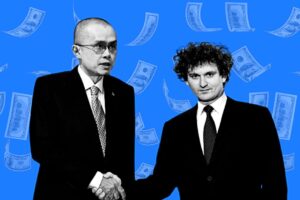Michael Lewis Drops Bombshell Book "Going Infinite," Revealing $2.2 Billion Deal Between SBF and CZ – Coinpedia Fintech News

Acclaimed author Michael Lewis has just released his latest book, “Going Infinite,” and it’s already making waves in the cryptocurrency community. But what is the real shocker? In mid-2021, Bankman-Fried, founder of crypto exchange FTX, proposed to buy back FTX shares from Binance’s CZ for a whopping $2.2 billion—a stark increase from Binance’s initial purchase price of $80 million in 2019. Just when the deal was to be closed, CZ tacked an additional $75 million. Bankman-Fried agreed.
Michael Lewis, known for his masterful storytelling, appears to have met his match in Bankman-Fried. Lewis admits his initial optimism about the crypto magnate, even encouraging a friend to go into business with him. But as the book unfolds, it’s clear that Lewis had reservations, mainly as Bankman-Fried’s empire started to crumble.
The Illusion of a “Different Kind of Crypto Guy”
Bankman-Fried presented himself as a socially conscious, vegan crypto entrepreneur whose ultimate goal was to make “infinity dollars” to save humanity from existential risks. Yet, despite his lofty aspirations and disheveled charm, the events leading up to his trial for fraud tell a different story. His promise to be a force for good in the often morally ambiguous world of cryptocurrency raises questions about the responsibility that comes with wielding immense financial power.
Michael Lewis was blindsided, or so he claims, by the ultimate downfall of Bankman-Fried’s crypto empire. Despite having a front-row seat to the unfolding drama in the Bahamas, Lewis writes that he didn’t sense anything was amiss. The mystery deepens when considering that Bankman-Fried had nearly admitted in an interview earlier that year that the crypto industry was akin to a Ponzi scheme.
The Complex Portrait of SBF
Lewis gives readers a complex portrait of Bankman-Fried, a man disinterested in art and Shakespeare but deeply invested in the concept of “humanity.” He shows a Bankman-Fried who wrote private musings about being misunderstood, even as he allowed others to perpetuate lies for him. This mix of vulnerability and audacity leaves readers questioning not just the man himself but also the ecosystem that allowed his rise and fall.
While Bankman-Fried gets significant airtime in Lewis’s book, the voices of devastated employees and investors who believed in his vision are given less space. Some of these individuals claim that they were led to lie for Bankman-Fried, who dismissed their concerns as mere “accounting errors.”
Source: Read Full Article
